Kate Jean Hollowell’s “Say Hi After You Die” took home the Short Film Jury Award: U.S. Fiction at the 2024 Sundance Film Festival.
By Lucy Spicer
One of the most exciting things about the Sundance Film Festival is having a front-row seat for the bright future of independent filmmaking. While we can learn a lot about the filmmakers from the 2024 Sundance Film Festival through the art that these storytellers share with us, there’s always more we can learn about them as people. This year, we decided to get to the bottom of those artistic wells with our ongoing series: Give Me the Backstory!
As summer heats up and the 2024 Sundance Film Festival Short Film Tour officially begins its circuit, we’re digging back into all the short films that had us laughing, crying, gasping, and contemplating at the Sundance Film Festival earlier this year. To commemorate Pride Month, we’ve assembled nuggets of wisdom from six of the LGBTQ+ filmmakers who brought their shorts to the 2024 Fest, including three award winners.
Through their unique and insightful short films, these six filmmakers explore a tense meeting between a wealthy couple and some scrap dealers, unexpected fallout from a gift of new sneakers, a haunting through a queer lens, a portrait of a gender nonconforming creative, a reincarnation involving a portable toilet, and a horror story about the monsters in our minds.
Read on to learn more about six of the LGBTQ+ filmmakers who brought their stories to the 2024 Sundance Film Festival Short Film Program.
What was the biggest inspiration behind this film?
Àlex Lora Cercós (The Masterpiece): “‘Homo homini lupus.’ The seed for this concept was Hobbes’ idea that ‘men are wolves to other men,’ referring to the dark aspect of human nature where individuals may act in ways that are detrimental to others. The realities of class struggle, immigration, and racism served as triggers. Additionally, the game of chess, both conceptually and visually, played a significant role for me as the director. I envisioned the story as a strategic battle between white and black pieces on an uneven board with different privileges.”
Gerardo Coello Escalante (Viaje de Negocios): “When I met my now girlfriend, we shared stories of growing up, as you do when you get to know someone. On our second date, I told her anecdotes about being a child in Mexico City at a very close-knit private school, naïve to the bigger forces around me and vying to be closer to America in whatever way possible. She told me there was a movie somewhere in those stories, and in January of last year we started developing what has now become this short film.”
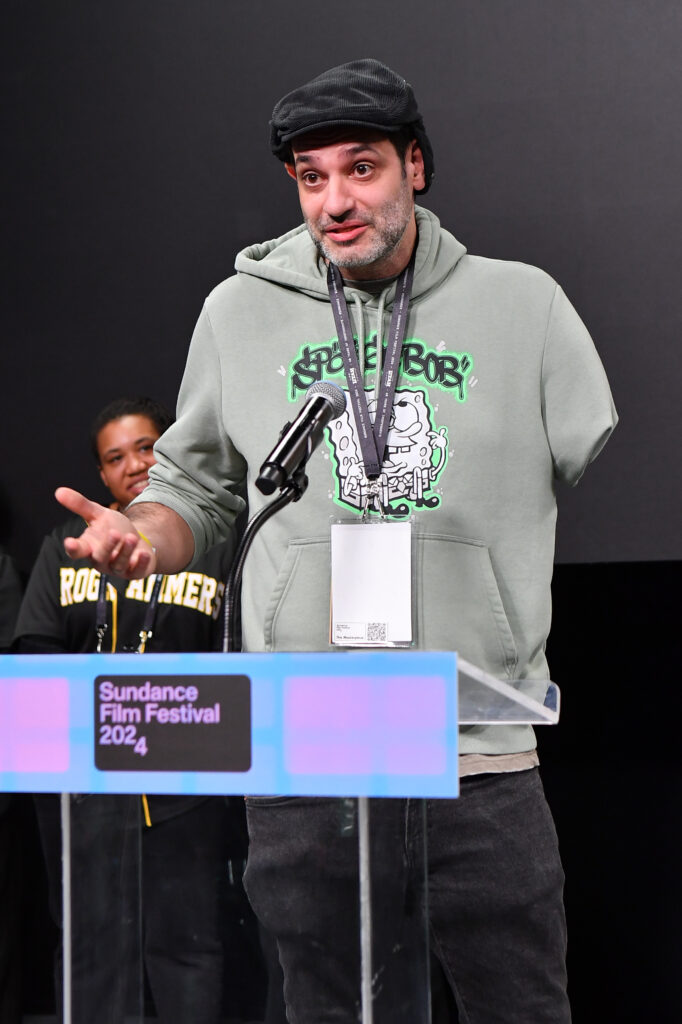
Director Àlex Lora Cercós was awarded the Short Film Grand Jury Prize for his short “The Masterpiece” at the 2024 Festival. (Photo by Andrew Walker/Shutterstock for Sundance Film Festival)
Dylan Guerra (Didn’t Think I’d See You Here): “I wanted to tell a queer ghost story. So often LGBTQ+ people are removed from the genre spaces — I was very passionate about queering the lens of a traditional haunting, updating it and putting it against the backdrop of modern day Bushwick.
“At the time of writing and conceptualizing the film, I was dealing with a particular sort of heartbreak that made me feel like I was being haunted — and worse, that everyone could see that something was haunting me. This translates into Didn’t Think I’d See You Here in a variety of ways and provides inspiration for a big thematic element I won’t reveal so I don’t spoil the surprises in the film.
“Another bit of inspiration for this film is a true story: One morning, my roommate and I woke up to find our shower running without either of us having turned it on. We began to joke that our apartment was haunted. This is a direct parallel of the opening scene in the film.”
Alex Hedison (ALOK): “ALOK. Who they are and the work they’re doing in the world, uniquely expressed through their writing, speaking, and art-making.”
Kate Jean Hollowell (Say Hi After You Die): “A big, old, beautiful port-a-potty. And the idea of reincarnation. What a combo.”
Masha Ko (The Looming): “My grandfather passed very unexpectedly, and I didn’t get to say goodbye.”
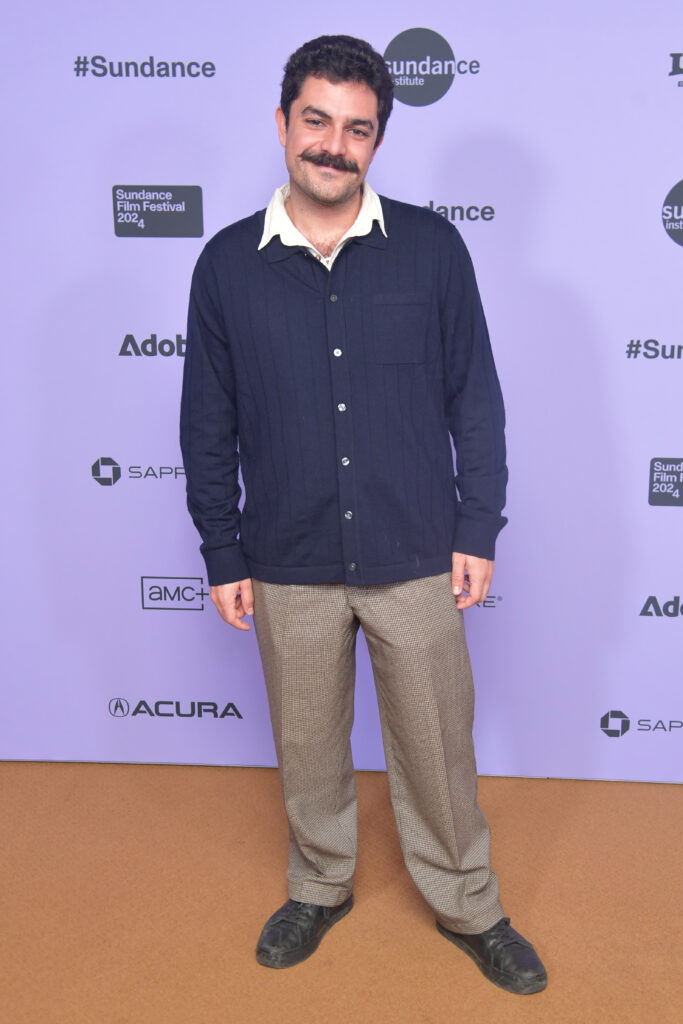
Gerardo Coello Escalante, writer-director of “Viaje de Negocios,” attends the January 20 premiere of Short Film Program 3 at the Egyptian Theatre in Park City. (Photo by Stephen Lovekin/Shutterstock for Sundance Film Festival)
Describe who you want this film to reach.
Cercós: “We wanted to reach the general public and global audiences, crafting a film that is accessible, engaging, and thought-provoking for people from diverse backgrounds. We also believe it holds potential interest for educational institutions, serving as a catalyst for discussions about systemic issues. Additionally, we see value in sharing it with community organizations, as it has the capacity to spark meaningful conversations that may lead to actionable initiatives.”
Guerra: “I want this film to reach LGBTQ+ people and horror enthusiasts. People who are looking to see more of themselves in genre spaces. And also people who are interested in the more surreal sort of horror.”
Hedison: “I’d love the film to reach those who have a preconceived idea of gender and acceptable gender expression, who fear what they don’t know. We are all learning and changing, every minute. Hopefully this film offers a new perspective on an old story.”
Ko: “This film should reach audiences who appreciate psychological horror with a deeper meaning — those who seek films that not only thrill but also provoke thought and stir empathy. It’s particularly resonant for viewers attuned to societal issues around aging and technology’s impact on human connection. This film hopes to speak to older viewers who may directly relate to the themes, as well as younger viewers, serving as a reflective lens on the universal journey of aging. It’s for anyone who values horror films that challenge social norms and explore the often unseen facets of life.”
Why does this story need to be told now?
Escalante: “I think there is a kind of falling out of love with America that I see in many peers — like the sheen has rubbed off. I think it feels very much like getting to be old enough to realize that your parents are fallible. There is a universal quality to that, but it also feels specific to this time we’re living in, these problems we’re facing.”
Guerra: “Didn’t Think I’d See You Here is dissecting the millennial anxiety around loneliness, and in particular queer loneliness. It’s a haunting tale surrounding a void. The story needs to be told now because we are living in a time that feels hyperexistential; political, environmental, and health crises surround us daily. This film explores this dread but does so from an upbeat, almost surrealist, and fun angle — it is a mingling of humor and fear. Also, in a world of reboots and revivals, this is a classic ghost story that’s been updated and refreshed so that it is both familiar and its own bold, new thing.”
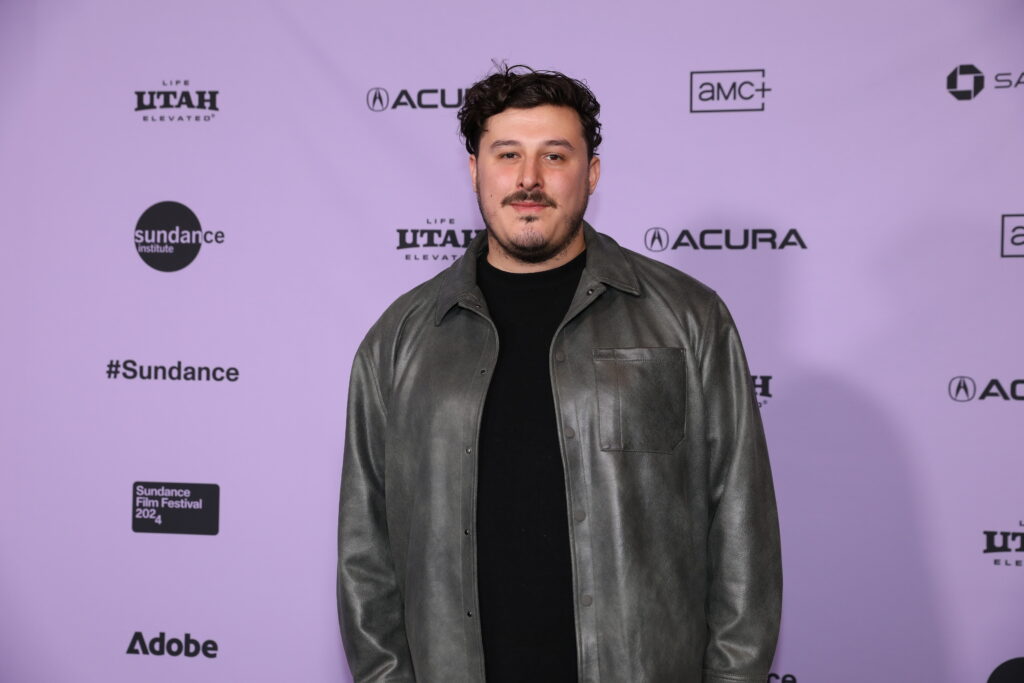
Dylan Guerra, writer-director of “Didn’t Think I’d See You Here,” attends the January 21 premiere of Short Film Program 4 at Prospector Square Theatre. (Photo by Maya Dehlin)
Ko: “The Looming is a story that speaks to what many quietly endure — the creeping solitude that comes with aging and the daunting specter of dementia. It’s a story that shines a light on the often ignored realities of our elders, who are too frequently relegated to the margins of our narratives and our lives.
“In today’s fast-paced world, where technology often eclipses personal connection, this film also attempts to remind us of the human need for empathy and recognition, regardless of age. The use of an audio assistant speaker in the film isn’t just a nod to technological advances, but a symbol of the connection we all seek — underscoring how, despite the digital age’s promises of closeness, we can still find ourselves alone.
“Ultimately, The Looming reminds us of the silent echoes of aging and serves as a call to look at our elders with empathy and inclusivity.”
How do you want people to feel after they see your film?
Cercós: “It would be interesting if some members of the audience were to experience a degree of discomfort that could prompt self-reflection. The hope is that this uneasiness would lead people to question ingrained biases, recognize their own privilege, and consider how we all can contribute to a more inclusive and just society.”
Hedison: “Hopeful, curious, and excited by the endless possibilities in life. And that there are an infinite number of ways to be human.”
Your favorite part of making the film? Memories from the process?
Escalante: “Working with all of these young actors was really such a joyous experience. We felt a responsibility toward them to make their first experience on set a good and happy one. Having them on set really infused a sense of magic — they were discovering moviemaking. The crew brought their best selves every day, and I’m incredibly grateful that so many people, including the parents and the school staff, made this film what it is. You won’t find better community support than in Mexico.”
Hollowell: “We shot a majority of the film at my house in Los Angeles. It felt like every day I was having a birthday party for myself (where I forced everyone to focus all their actions around me while I bossed them around). And the best part was that shooting at my house was free, and there was no homeowner or locations manager to tell us we couldn’t leave a forklift in the driveway overnight.”
Films are lasting artistic legacies; what do you want yours to say?
Hollowell: “We’re all just friends walking each other home.”
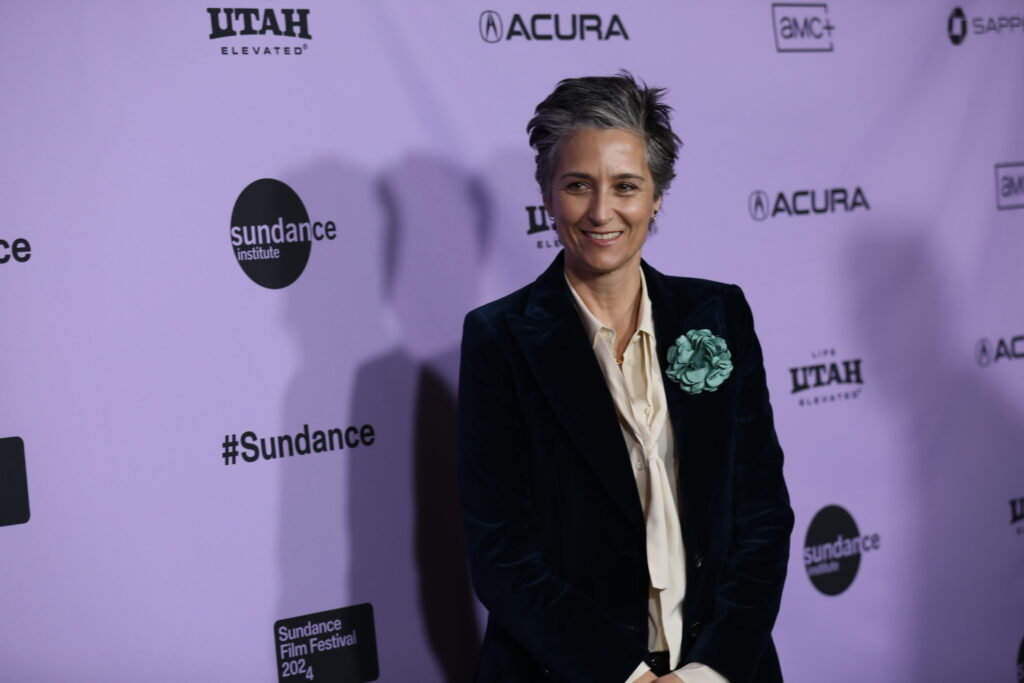
Alex Hedison, director of “ALOK,” attends the January 18 premiere of Short Film Program 1 at Prospector Square Theatre. (Photo by Maya Dehlin)
If you weren’t a filmmaker, what would you be doing?
Guerra: “Probably event planning. Or, oh God, politics. Oh, no.”
Hollowell: “Mini golf business owner”
What is something that all filmmakers should keep in mind in order to become better cinematic storytellers?
Escalante: “At the end of the day, film is a highly collaborative process. Having trust in and respect for your actors, your crew, your producers, and everyone else who gives their time and energy to make a film is as important as developing a cohesive vision for the project.”
Hedison: “Everyone has their own personal truth test. As an artist, I ask myself the question, ‘Am I feeling this, or am I thinking it? Does the choice I’m making in a moment, a scene, or an image elicit a feeling in me? Am I choosing this path out of genuine instinct or merely an anticipated result?’ If the art gesture connects with me, then I know it will connect with others as well.”
Ko: “You can learn everything when it comes to the technicalities of making a film. But what you cannot easily learn is an authentic understanding of different life phenomena. So, my advice to filmmakers is to stay curious and open to interesting life experiences. There are some stories that I have written that I know I cannot yet tell due to my limited first-hand understanding of the phenomena at hand.”
What was the last book you read?
Escalante: “The Dispossessed by Ursula K. Le Guin”
Guerra: “The Broken Earth trilogy by N. K. Jemisin (Read it!!!! It will change you!!)”
Hollowell: “Proof of Heaven: A Neurosurgeon’s Journey into the Afterlife by Eben Alexander”
Ko: “The Book of Disquiet by Fernando Pessoa”
Tell us about your history with Sundance Institute. When was the first time you engaged with us? Why did you want your film to premiere with us?
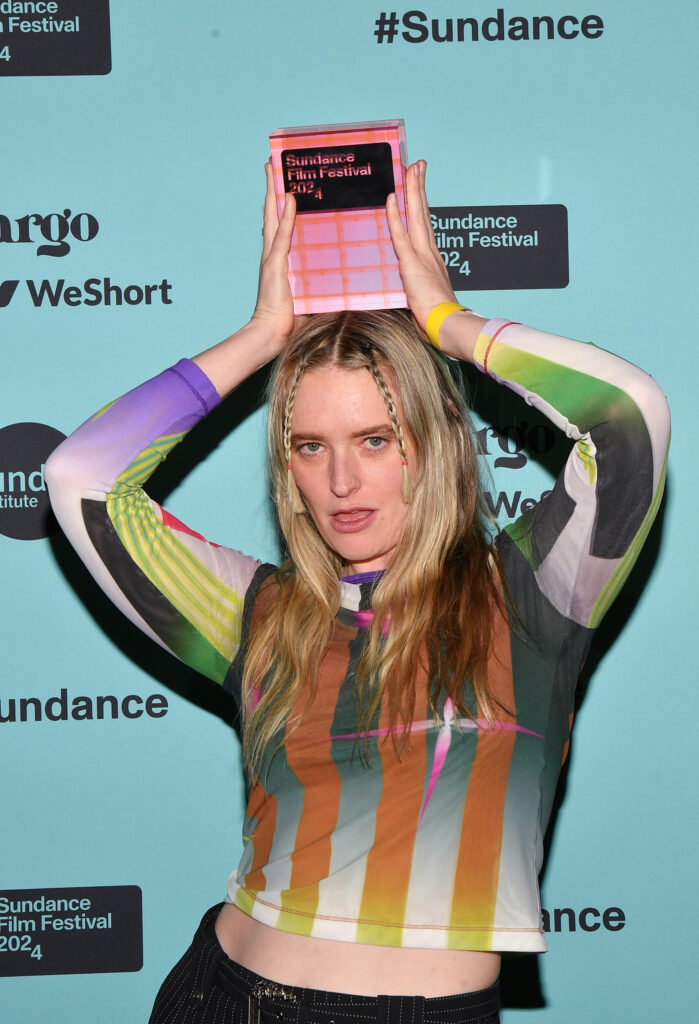
Director Kate Jean Hollowell wins the Short Film Jury Award: U.S. Fiction for her short “Say Hi After You Die” at the 2024 Festival. (Photo by Andrew Walker/Shutterstock for Sundance Film Festival)
Cercós: “The first time was in 2012 when my short documentary Odysseus’ Gambit was selected. In 2014, I had another short documentary titled A Hole in the Sky in the program. In 2017, our feature documentary The Fourth Kingdom received a Sundance documentary grant, which essentially allowed us to produce the film. So, I wanted to premiere this fiction at Sundance because it represents the best possible scenario and is a dream come true. Additionally, the Festival holds special significance for me, having played a transformative role in my career. I moved to the U.S. coming from a poor neighborhood in Barcelona, with no contacts in the film industry, so the support garnered through these selections was key to my journey as a filmmaker.”
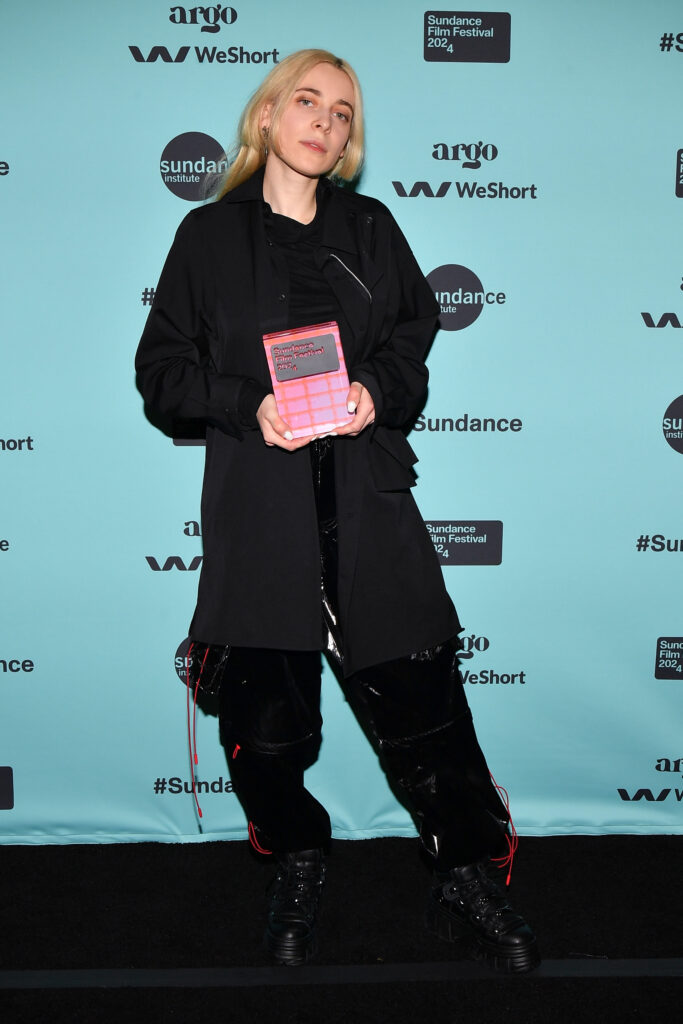
Writer-director Masha Ko was awarded a Short Film Special Jury Prize for Directing for “The Looming” at the 2024 Festival. (Photo by Andrew Walker/Shutterstock for Sundance Film Festival)
Escalante: “I first came to Sundance in 2018 with the Ignite program. Through that fellowship, I was invited to participate in the 2018 Creative Producing Summit with my feature script Forgive Us Sinners. At the summit, I was invited to send my script for consideration to the Feature Film Program, and I was accepted into the 2019 Screenwriters Intensive. Sundance is a rare champion for early-career independent filmmakers. Premiering here is a dream come true.”
Who was the first person you told when you learned you got into the Sundance Film Festival?
Cercós: “I initially thought the message was a rejection, so I had to read the first paragraph a couple of times to believe that the film was selected. I got a bit emotional and I texted the news to my family in Spain. Later, I shared them with my wife and kids.”